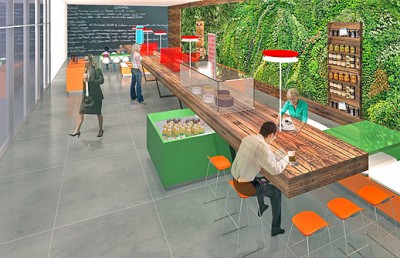When coworking and coffeehouse merge

The previous entry profiled the Architect magazine story, The Next Coffeehouse, and there’s one that truly stood out to me as something that a creative would say, “You know, I’d actually really want to work there.”
Designed by STUDIOS Architecture, their Modular Community Kitchen concept is the spatial inverse of the piazza, with a 60′ communal table serving as the ‘town square’. Greg Keffer, principal, provided some insight in this CoolTown interview:
Do you think the market is ready for the modular community kitchen now?
“Yes, I think people are ready for this and should have no problem adapting just as they have in workplaces. Our concept is based on ideas we originated over the years in workplace design. By looking at shared table type environments vs. typical cubicles you can immediately understand the effect on communication, spontaneity, and curiosity and how that can translate to idea generation, efficiency, and community in work. If STUDIOS has been successful in transforming how people can interact at work, why can’t we apply those same ideas to how people interact in social places such as a cafe?”
What are the modular components of the space?
“There are the functional pieces such as cases for cold beverages and food, then there are more versatile pieces such as peninsula tables that build off the main 60′ long common table. These create nodes for gathering, or can be a place where someone might find more privacy rather than sitting on the common area. The concept also allows for the pieces to branch off from the main table and create areas in the space for special settings such as a poetry reading, or community gathering. The table is simply a framework which elements (and people) work organically off of.”
What is the signature element of such a space that identifies it as a coworking cafe?
“This has to be the 60′ long common table.”
Would you work there?
“Of course I would – I embrace the ideas of community and sharing of ideas – this is an exciting point of view to how [the modern coffeehouse] could become truly localized.”

Leave a Reply